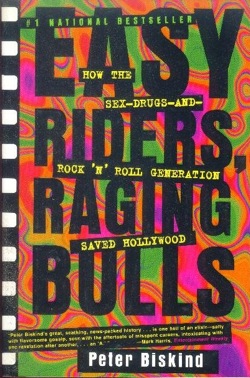 I’m pretty sure the first movie book I read cover-to-cover was Peter Biskind’s Easy Riders, Raging Bulls, a high-calorie, sex ‘n’ drugs ‘n’ gross participation page-turner that maps the ascent and deflation of the “New Hollywood” filmmakers from 1967 to 1980. For a high schooler, it was a simple story with an irresistible through line and a cast of unsavory, irascible geniuses. Even without seeing all the films described in the book, this gossipy chronicle of long-haired movie brats sold a seductive premise: a vanished kingdom of personal, American auteurist cinema, wiped off the beach by Jaws and its blockbusting successors.
I’m pretty sure the first movie book I read cover-to-cover was Peter Biskind’s Easy Riders, Raging Bulls, a high-calorie, sex ‘n’ drugs ‘n’ gross participation page-turner that maps the ascent and deflation of the “New Hollywood” filmmakers from 1967 to 1980. For a high schooler, it was a simple story with an irresistible through line and a cast of unsavory, irascible geniuses. Even without seeing all the films described in the book, this gossipy chronicle of long-haired movie brats sold a seductive premise: a vanished kingdom of personal, American auteurist cinema, wiped off the beach by Jaws and its blockbusting successors.
Easy Riders, Raging Bulls, published in 1998 shortly after the release of Boogie Nights, spawned a ’70s revival that has now calcified into a peculiar critical consensus. The best-seller inspired two talking-head documentaries (A Decade Under the Influence and another named for and adapted from the Biskind book) and endless appreciations of films that were hardly underappreciated in the first place: The Godfather, Taxi Driver, The Exorcist, The Last Picture Show, Apocalypse Now.
Nor can we forget the recent films that consciously channeled the “New Hollywood Renaissance,” taking the procedural aloofness of All the President’s Men as a retro Rosetta Stone: Argo, The Informant!, Michael Clayton, Zodiac, American Hustle, and host of less memorable pictures. Grain equals grit.
By now, the ’70s are accepted so reflexively as “Hollywood’s Last Golden Age” that there’s little point in quibbling. Still, it’s difficult to name another era in Hollywood filmmaking impervious to the critic’s naturally revisionist impulse. The Best Picture Oscar winners of the ’30s or the ’80s are roundly ridiculed, but the ’70s class (Midnight Cowboy, The French Connection, The Godfather, The Godfather Part II, One Flew Over the Cuckoo’s Nest, Annie Hall) remains lionized.
